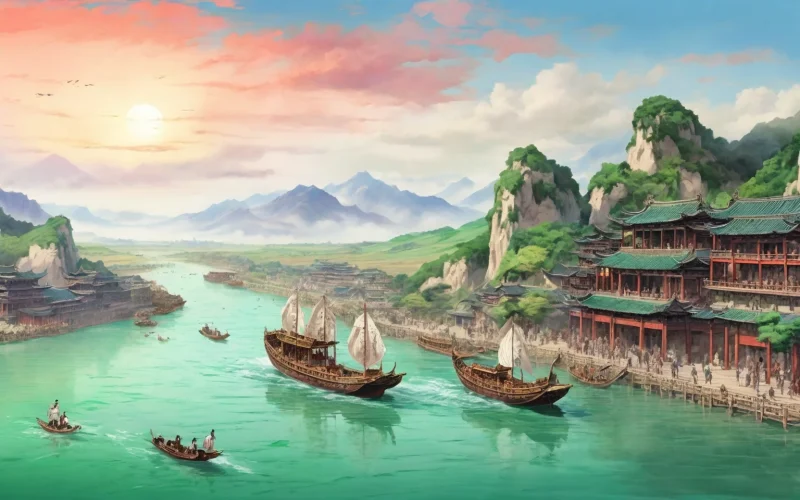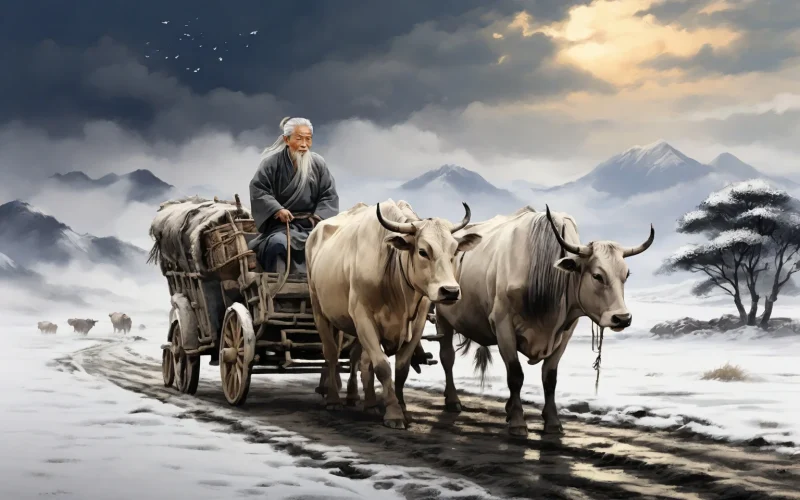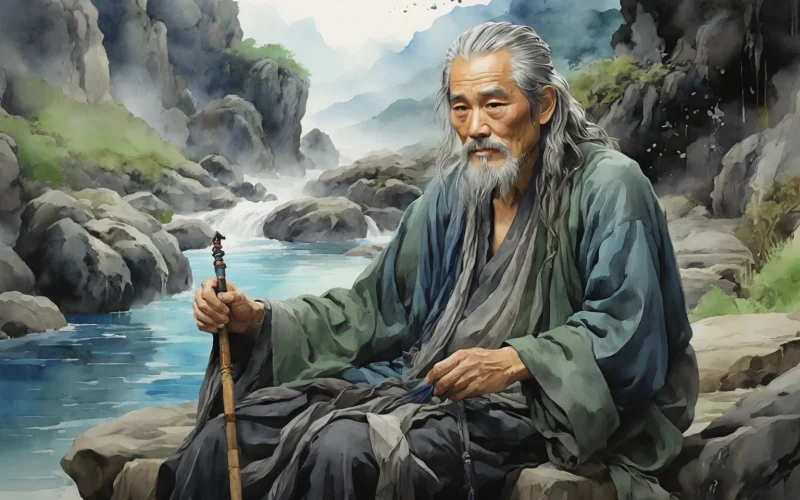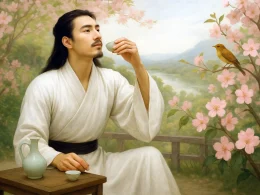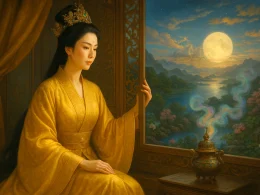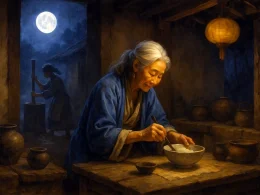The emperor went east to see the flowering town;
Mount Kunlun was cleft to let its water flow down.
Royal escorts leaving the palace went afloat;
Three thousand maids of honor mounted the dragon boat.
Drums were beaten to make clouds tremble and stars shiver;
Flags caressed waves, sun and moon floated on the river.
But by revolting armies the empire overthrown,
The emperor in the pavilion lost his crown.
Original Poem
「汴河亭」
许浑
广陵花盛帝东游,先劈昆仑一派流。
百二禁兵辞象阙,三千宫女下龙舟。
凝云鼓震星辰动,拂浪旗开日月浮。
四海义师归有道,迷楼还似景阳楼。
Interpretation
This poem takes as its subject Emperor Yang of Sui's extravagant eastern tour to Guangling (modern Yangzhou), laying bare his decadent excesses while offering a historical warning about the self-destructive fate of tyrants. To admire Guangling's famed flowers, Emperor Yang exhausted national resources to construct the Tongji Canal and build pleasure palaces like the Bian River Pavilion. Clearly composed when the poet passed the Bian River and recalled these events, the work delivers scathing criticism of imperial extravagance through vivid imagery, embodying profound reflection on dynastic collapse.
First Couplet: "广陵花盛帝东游,先劈昆仑一派流。"
Guǎng líng huā shèng dì dōng yóu, xiān pī kūn lún yī pài liú.
When Guangling's blooms drew imperial gaze,
He split Kunlun's streams for his waterways.
The opening reveals the journey's frivolous pretext—flower viewing. The mythical hyperbole of "splitting Kunlun" underscores Yang's willingness to reshape nature for personal indulgence, symbolizing both his hedonism and political recklessness.
Second Couplet: "百二禁兵辞象阙,三千宫女下龙舟。"
Bǎi èr jìn bīng cí xiàng quē, sān qiān gōng nǚ xià lóng zhōu.
Two hundred guards left palace gates,
Three thousand maids boarded dragon barges.
The massive entourage—soldiers and concubines alike—illustrates the tour's obscene scale. "Left palace gates" and "dragon barges" coldly document the spectacle while implicitly condemning its wastefulness.
Third Couplet: "凝云鼓震星辰动,拂浪旗开日月浮。"
Níng yún gǔ zhèn xīng chén dòng, fú làng qí kāi rì yuè fú.
Drums shook clouds, made stars tremble,
Flags parted waves where sun and moon seemed to assemble.
Surreal exaggeration ("stars tremble," "sun and moon float") transforms the scene into grotesque pageantry, satirizing the emperor's disruption of natural and political order through his excesses.
Fourth Couplet: "四海义师归有道,迷楼还似景阳楼。"
Sì hǎi yì shī guī yǒu dào, mí lóu hái sì jǐng yáng lóu.
Righteous armies rose empire-wide,
Folly Tower mirrored Chen's final pride.
The conclusion delivers historical judgment: "Folly Tower" (Yang's pleasure palace) parallels the "Jingyang Tower" where the last Chen emperor met his end—a damning comparison underscoring cyclical dynastic collapse. "Righteous armies" signals heaven's mandate withdrawn from the corrupt.
Holistic Appreciation
Through lavish depictions—the flower pretext, canal construction, military escorts, and concubine-laden barges—the poem constructs a grandiose yet hollow historical panorama. Climactic images of drum-shaken stars and flag-parted waves push the scene to surreal extremes, artistically conveying societal rupture. The abrupt finale's "Folly Tower" analogy crystallizes the theme: like the Chen dynasty before it, Sui's collapse stemmed from imperial debauchery. Blending artistic grandeur with political parable, the work transcends its era as timeless caution.
Artistic Merits
- Hyperbole and irony: Mythic imagery ("split Kunlun," "stars tremble") heightens satirical impact
- Crescendo structure: Each couplet escalates from motive to spectacle to consequence
- Historical allegory: The Jingyang Tower parallel delivers the moral with devastating economy
Insights
More than historical tableau, this poem serves as political mirror. Its opulent surface conceals razor-sharp critique: national survival hinges on popular welfare. By embedding warning within splendor, the poet reminds us that luxury and tyranny breed collapse—a lesson for all who wield power. Just as Guangling's flowers masked coming ruin, today's apparent prosperity may hide tomorrow's decline unless rooted in virtuous governance.
About the poet
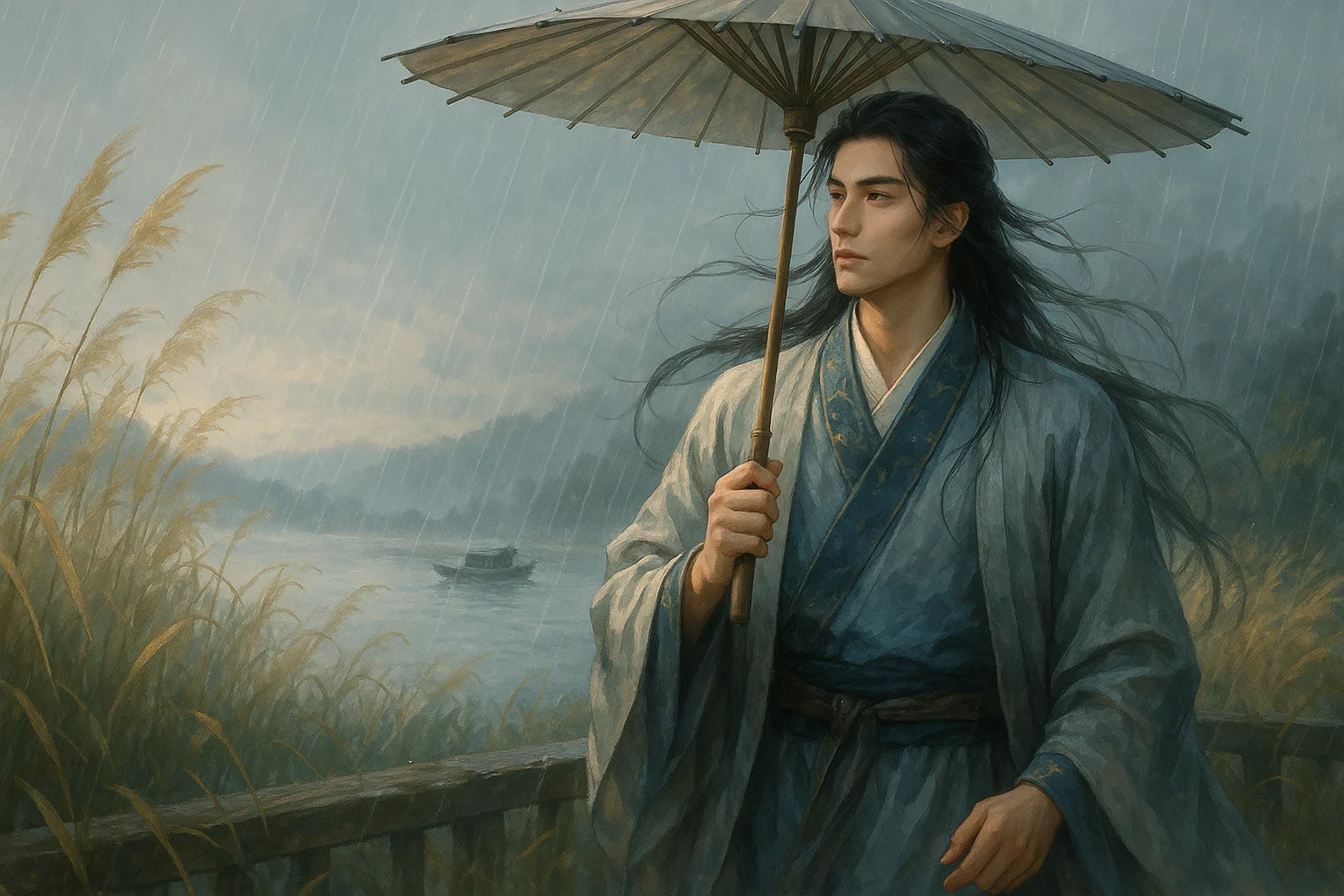
Xu Hun (许浑), c. 791 - 858 AD, was a Tang Dynasty poet, a native of Danyang, Jiangsu Province. He was one of the most influential poets of the Late Tang Dynasty. His poems are characterized by nostalgia for ancient times and idyllic poems, in which he describes the scenery of water and rain.






